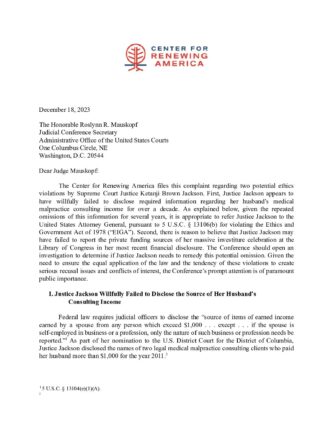
CRA Files Ethics Complaint Against Justice Ketanji Brown Jackson for Failing to Disclose Husband’s Income
December 18, 2023
The Honorable Roslynn R. Mauskopf
Judicial Conference Secretary
Administrative Office of the United States Courts
One Columbus Circle, NE
Washington, D.C. 20544
Dear Judge Mauskopf:
The Center for Renewing America files this complaint regarding two potential ethics violations by Supreme Court Justice Ketanji Brown Jackson. First, Justice Jackson appears to have willfully failed to disclose required information regarding her husband’s medical malpractice consulting income for over a decade. As explained below, given the repeated omissions of this information for several years, it is appropriate to refer Justice Jackson to the United States Attorney General, pursuant to 5 U.S.C. § 13106(b) for violating the Ethics and Government Act of 1978 (“EIGA”). Second, there is reason to believe that Justice Jackson may have failed to report the private funding sources of her massive investiture celebration at the Library of Congress in her most recent financial disclosure. The Conference should open an investigation to determine if Justice Jackson needs to remedy this potential omission. Given the need to ensure the equal application of the law and the tendency of these violations to create serious recusal issues and conflicts of interest, the Conference’s prompt attention is of paramount public importance.
I. Justice Jackson Willfully Failed to Disclose the Source of Her Husband’s Consulting Income
Federal law requires judicial officers to disclose the “source of items of earned income earned by a spouse from any person which exceed $1,000 . . . except . . . if the spouse is self-employed in business or a profession, only the nature of such business or profession needs be reported.”1 As part of her nomination to the U.S. District Court for the District of Columbia, Justice Jackson disclosed the names of two legal medical malpractice consulting clients who paid her husband more than $1,000 for the year 2011.2
On her subsequent filings, however, Justice Jackson repeatedly failed to disclose that her husband received income from medical malpractice consulting fees. We know this by Justice Jackson’s own admission in her amended disclosure form for 2020, filed when she was nominated to the Supreme Court, that “some of my previously filed reports inadvertently omitted” her husband’s income from “consulting on medical malpractice cases.”3 Compounding the omission and further demonstrating willfulness, Justice Jackson has not even attempted to list the years for which her previously filed disclosures omitted her husband’s consulting income. Instead, in her admission of omissions on her 2020 amended disclosure form (filed in 2022), Justice Jackson provided only the vague statement that “some” of those past disclosures contained material omissions.
Given that she was aware of this provision when she filed her first form in 2012, it would appear the Justice Jackson willfully violated § 13104(e)(1)(A) because she did not disclose this required information on her forms for several years. The fact that she referenced her omission in 2022 and did not correct it as required is more indicia of her willfulness to not report this information.
Apart from being willful and illegal, Justice Jackson’s omission creates serious recusal issues. The nature of her husband’s work on legal medical malpractice consultation inherently creates significant conflicts of interest about which parties and the public are entitled to know. Due to Justice Jackson’s failure to disclose her husband’s medical malpractice clients, the public and parties are left without the opportunity to ensure that she has no conflict of interest in a particular case. By voting on cases or petitions involving or materially affecting the interests of her husband’s clients or counsel, Justice Jackson shields potential conflicts of interests and creates an appearance of impropriety.
In sum, Justice Jackson’s refusal to list the years for which her husband received medical malpractice consulting income is a flagrant violation of EIGA. And her admission of this failure and refusal to list the years in which her husband received such income only demonstrates willfulness. Pursuant to § 13106 (b), the Judicial Conference should refer Justice Jackson’s willful violation to the Attorney General.
It is also troubling that Justice Jackson disclosed two sources of her husband’s medical malpractice consulting work in 2011 and then never disclosed another source despite his having received such income in subsequent years. In addition to her willful failure to disclose his type of income, Justice Jackson now apparently seeks to describe her husband’s consulting work under the “self-employment” exception in order to avoid disclosing the sources of her husband’s consulting income, in contrast to her disclosures of such sources in her initial filing. But there seems to be no change in the services he was providing to justify such a change, and this “self-employment” exception does not appear to fit the type of work in which Justice Jackson’s spouse engaged. Justice Jackson is thus potentially shielding from disclosure companies paying her husband significant streams of income who may have interests before the Supreme Court.
If her husband’s income does not qualify for the “self-employment” exception, EIGA requires Justice Jackson to identify the “source of items of earned income earned by a spouse from any person which exceed $1,000.”4 Since 2012, she has not disclosed these sources. The available evidence demonstrates that this potential violation was willful. Justice Jackson was aware of the requirement to list the specific sources of her husband’s consulting income when she did so on her first disclosure filed in September 2012, which listed the names of LLCs and incorporated entities that paid her husband more than $1,000 in malpractice consulting fees in 2011.5 Yet on her forms for over a decade since then, Justice Jackson has failed to disclose any such source of income. Her subsequent amendment does nothing to remedy this violation. As noted above, she has admitted that “some of” her reports omitted her husband’s medical malpractice consultation income.6
She also has not attempted to explain why her husband’s consulting income in 2011 was required to be specifically reported, but his consulting income for subsequent years was either unreportable or reportable only pursuant to the self-employment provision. We therefore request that the Conference investigate whether Justice Jackson is also violating the law by not disclosing the sources of her husband’s medical malpractice consulting income, and whether this omission was willful.
Justice Jackson’s willful refusal to disclose her husband’s medical malpractice consulting income on several reports undermine the text and fundamental purpose of the ethics laws and calls into doubt her ability to discharge her duties impartially. The Conference should refer her to the Attorney General for an official investigation into this matter. It should also investigate whether Justice Jackson was required to list the specific sources of her husband’s consulting income, and whether referral is warranted for this separate potential violation.
II. Justice Jackson Potentially Failed to Disclose Private Contributions to Her Investiture Celebration as a Gift as Required by the EIGA
On the day of Justice Jackson’s investiture, at her request, the Library of Congress hosted a massive invitation-only celebration featuring several musical performances.7 The Library of Congress has made clear that Justice Jackson’s investiture celebration was “a private event and is privately funded.”8 Despite its private funding, this event, described by watchdog groups as a “disturbing display of partisanship and favoritism,”9 went unreported on Justice Jackson’s most recent financial disclosure.10 This creates serious questions of her compliance with EIGA.
Section 13104(a)(2)(A) of EIGA requires judicial officers to disclose “the identity of the source, a brief description, and the value of all gifts” received over $415.11 EIGA defines “gift” as “a payment, advance, forbearance, rendering, or deposit of money, or any thing of value.”12 Based on publicly available reporting, this huge celebration clearly exceeded $415. Between food, entertainment, venue fees, and staff, this event easily cost tens of thousands of dollars, likely even more. EIGA unambiguously requires that Justice Jackson provide the identity of any private sources who funded this massive celebration.
If private sources did indeed contribute anything in excess of $415 to Justice Jackson’s investiture celebration, her failure to disclose such private funding is clearly a willful omission in violation of EIGA. No reasonable person could fail to understand that this huge celebration of her investiture qualifies as a “gift” under EIGA. And Justice Jackson demonstrated awareness of this same disclosure requirement when she reported other post-investiture gifts such as a $1,200 floral display.13 She also demonstrated knowledge of this requirement when she disclosed the receipt of $6,580 in designer clothes from Vogue Magazine for a photoshoot.14 Justice Jackson thus cannot claim ignorance of EIGA’s gift disclosure requirements, and there is no serious argument that this “massive event featuring performances by several musicians and groups” celebrating her investiture is not a “thing of value.”15
Justice Jackson’s potential omission seriously undermines public trust in the courts. The public is left wondering whether and which private interests paid for the event and if these undisclosed interests have business before the Court. Moreover, without the identity of the funders, it becomes impossible to detect conflicts of interest arising from this event, shielding Justice Jackson’s recusal decisions from public scrutiny. This potentially willful omission raises serious questions about Justice Jackson’s compliance with EIGA and warrants investigation and prompt correction.
III. Conclusion
Justice Jackson has demonstrated a disturbing trend of not reporting material sources of income and gifts. As described above, she has failed to report the years in which her husband has received income for his medical malpractice consulting, a blatant violation of EIGA. And she continues to fail to report the sources of her husband’s legal consultation income. Moreover, she has potentially failed to disclose private funders of her unprecedented investiture celebration. By doing so, Justice Jackson has shielded potential conflicts of interest from public scrutiny and undermined the ability of the public, outside watchdog groups, and parties to scrutinize her recusal decisions. Given the risk for these potentially willful omissions to create conflicts of interest and recusal issues, and the need to ensure equal application of the law, the Conference should refer Justice Jackson to the Attorney General for her failure to disclose her husband’s consulting income and open an investigation into the potential private funding of her investiture celebration.
Sincerely,
Russ Vought

President, Center for Renewing America
Endnotes
1 5 U.S.C. § 13104(e)(1)(A).
2 https://storage.courtlistener.com/us/federal/judicial/financial-disclosures/1609/ketanji-brown-jackson-disclosure.201 1.pdf.
3 https://storage.courtlistener.com/us/federal/judicial/financial-disclosures/1609/ketanji-brown-jackson-disclosure.202 0_1.pdf.
4 5 U.S.C. § 13104(e)(1)(A) (emphasis added).
5 https://storage.courtlistener.com/us/federal/judicial/financial-disclosures/1609/ketanji-brown-jackson-disclosure.201 1.pdf.
6 https://storage.courtlistener.com/us/federal/judicial/financial-disclosures/1609/ketanji-brown-jackson-disclosure.202 0_1.pdf.
7 Library of Congress,
https://www.loc.gov/item/event-406692/a-celebration-of-the-investiture-of-justice-ketanji-brown-jackson/2022-09-3 0/.
8 Houston Keene, Library Of Congress Explains Why It Hosted Jackson Investiture But Not For Gorsuch, Kavanaugh, Barrett, Fox News (Sept. 30, 2022),
https://www.foxnews.com/politics/library-congress-hosts-event-ketanji-brown-jackson-kavanaugh-gorsuch-barrett (emphasis added).
9Id.
10
https://storage.courtlistener.com/us/federal/judicial/financial-disclosures/1609/ketanji-brown-jackson-disclosure.202 2.pdf.
11 5 U.S.C. § 13104(a)(2)(A).
12 5 U.S.C. § 13101(5).
13 Mark Sherman and Jessica Gresko, Justice Jackson Reports Flowers From Oprah, Designer Clothing As Thomas Delays Filing Disclosure, AP (Jun. 7, 2023),
https://apnews.com/article/supreme-court-ethics-financial-disclosures-jackson-thomas-86c82bf325555fcdc90a2104c 245c026.
14 Id.
15 Houston Keene, Library Of Congress Explains Why It Hosted Jackson Investiture But Not For Gorsuch, Kavanaugh, Barrett, Fox News (Sept. 30, 2022), https://www.foxnews.com/politics/library-congress-hosts-event-ketanji-brown-jackson-kavanaugh-gorsuch-barrett.




